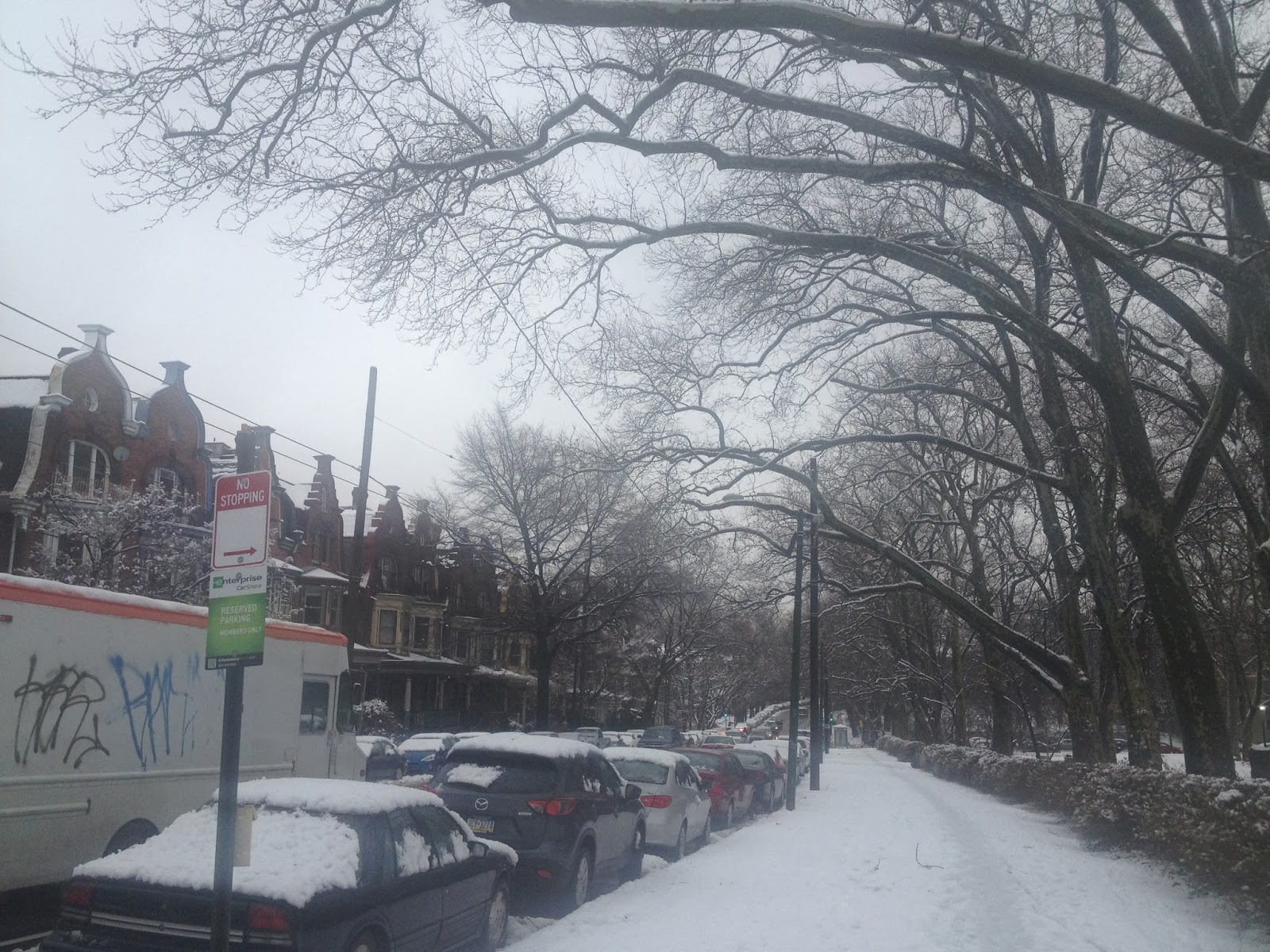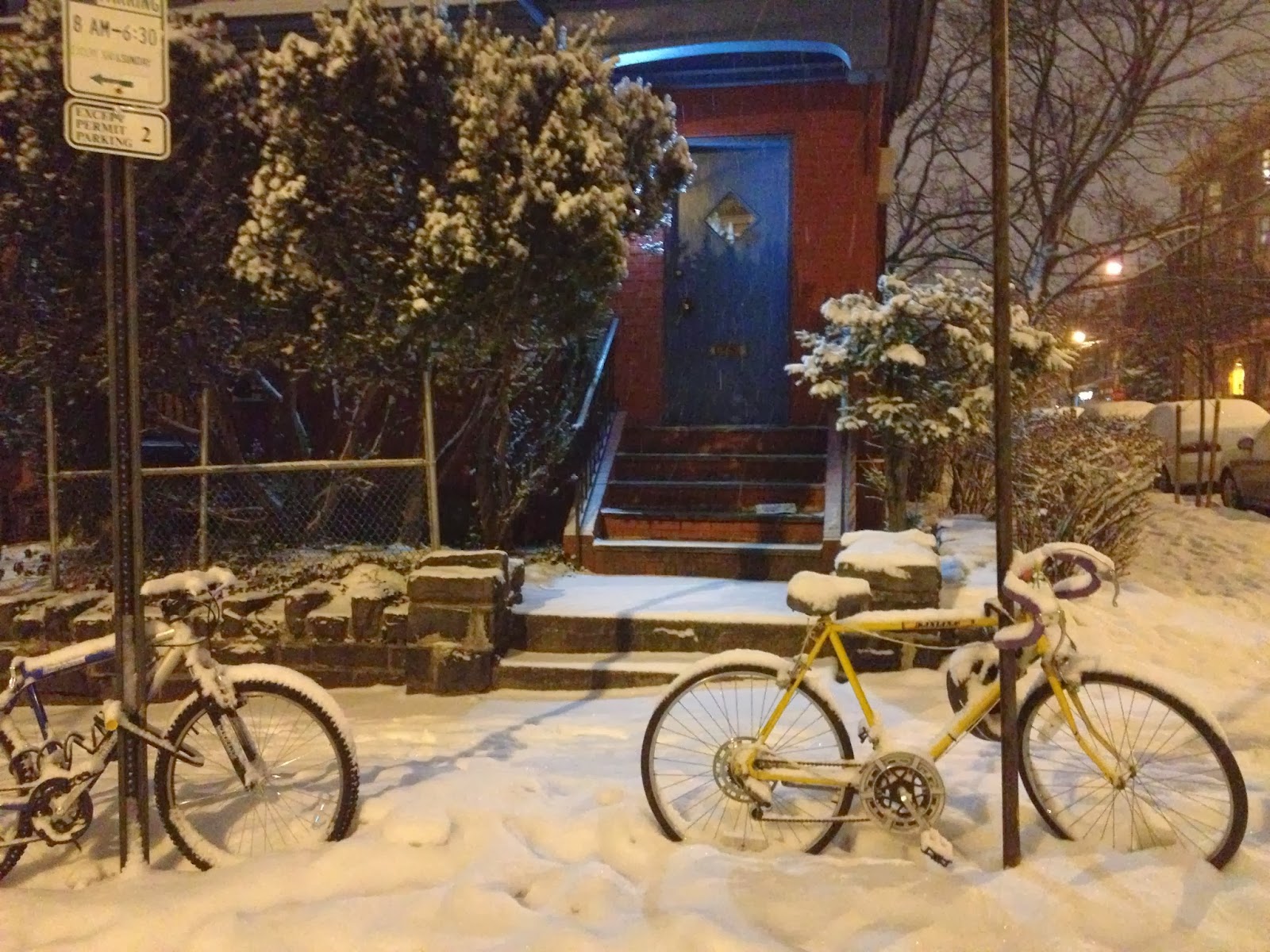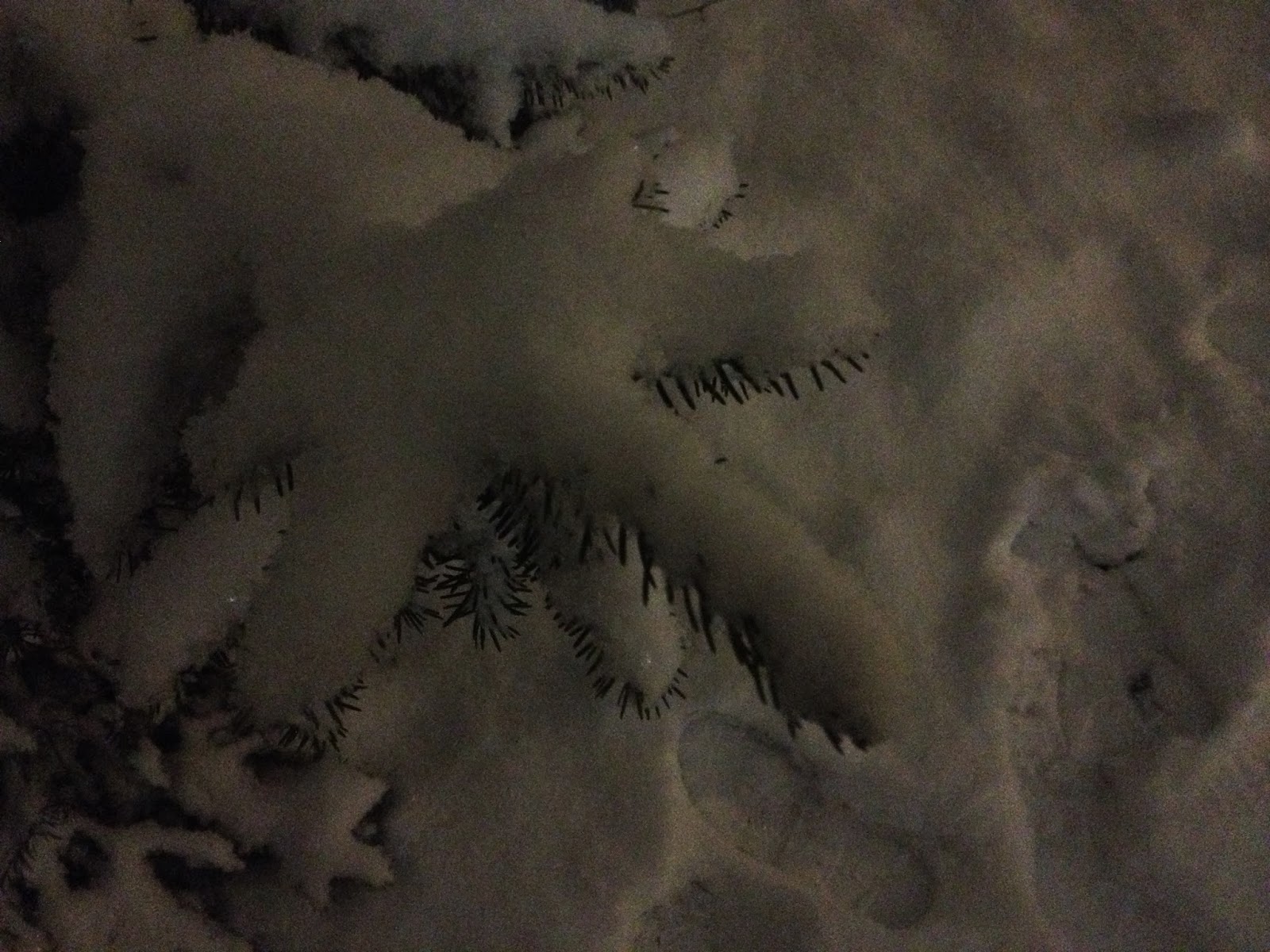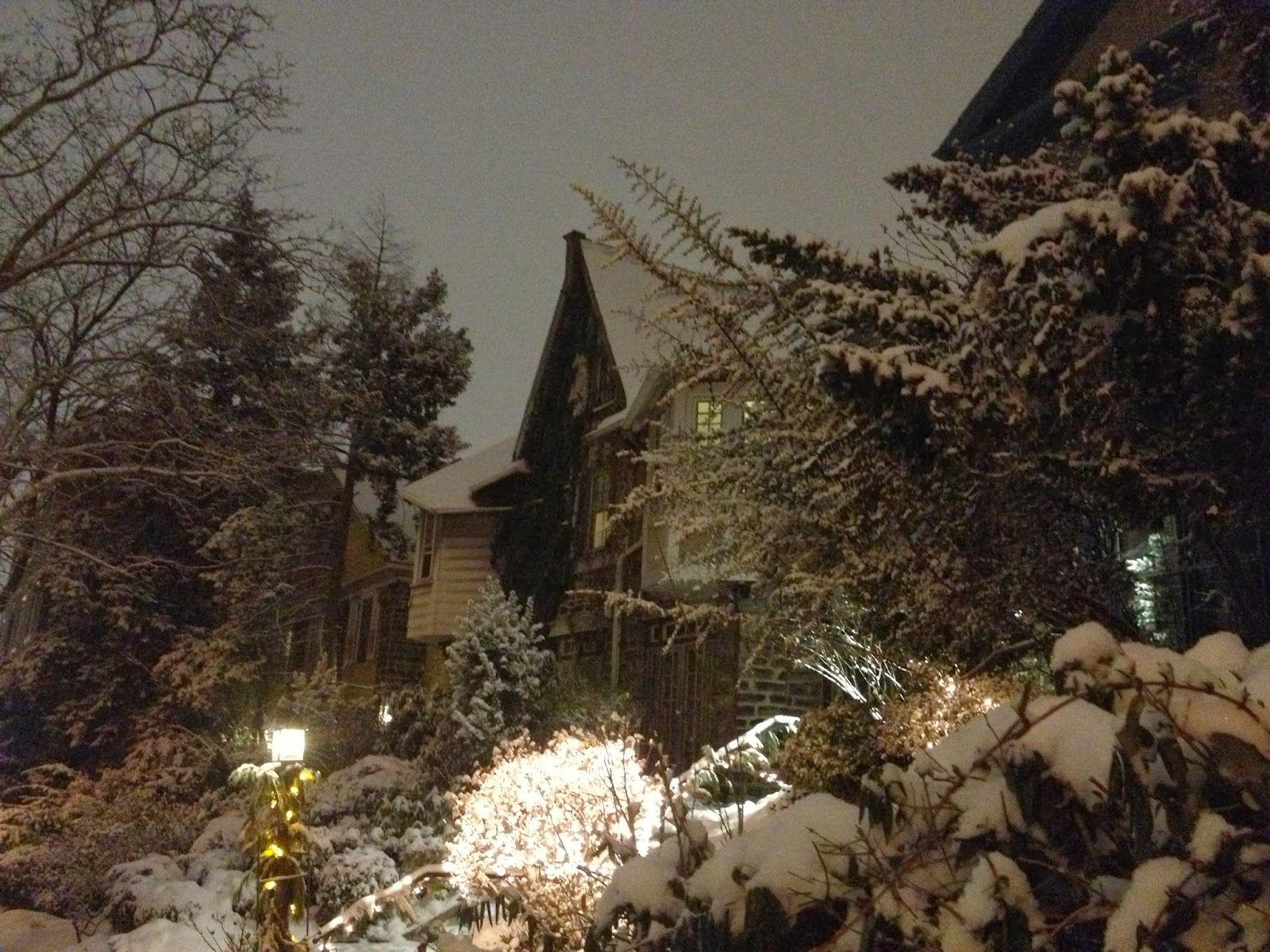Still Continues
to snow fast, looks gloomy…
…Mrs Reid of
Keysburg, Virg, with us, wood Scarce, difficult to get anymore…
…snow fast yet
new snow about 3 feet deep, wind Southwest, no Sign of clearing off…
..and on the
twelfth, fell in with some of the Indians, who treated us kindly, gave us Acorns…snowing fast,
wind Northwest. Snow higher than the
shanty, must be 13 feet deep, don’t know how to get Wood this morning…
…it is dredful
to look at.
It’s
been a rough and cold couple months, a winter of record.
It’s
been a full-time job, maintaining against the season, but I think I finally got
the hang of it.
I’ve
been keeping the thermostat at a balmy seventy degrees…
…although
somewhere inside the urban igloo there’s still a considerable draft coming in.
The
most likely culprit? The air-conditioner
installed in the eastern row of windows in the bedroom.
On
particularly drafty nights, I cover the box up with spare towels right before
crawling into bed.
Fresh
food is scarce and getting scarcer.
I’ve
been hoarding the remainder of my local produce, saving it for a special
dinner…
…one
final spaghetti squash and one last acorn squash called a carnivale.
Last
week, the spaghetti squash’s stem snapped off all on its own, a sure sign that
it doesn’t have much time left.
Over
the last few days, the carnivale has been developing a waxy residue over its
orange mottled ribs, one last defense against the inevitable mold.
I’ll
have to eat them both soon or else they go to waste.
After
that, it’s beans.
Maybe
mom was right.
Maybe
I should move west.
She moved out there years ago, settling down in the northeastern buckle of the Sonoran desert, a fine place to visit…
…a
desert by definition of its rainfall, a place of rock and canyons, but a
landscape lush with life…
…including
the saguaro cactus, my number one candidate for our national tree, my sincere apologies
to the oak.
One
time I went out there, around this time of year. We spent the long mornings hiking down the
dusty trail, learning the behaviors of the desert spring, climbing up into the
blue skies…
...and
the afternoons were for cooling off on the patio…
…figuring
out what’s for dinner, drinking something they call a margarita.
“Enjoy
the weather now,” she said. “It gets
way too hot by April.”
April.
Now
that sounds nice.
We
get cactus here too, mom, although they only come around to Philadelphia once a
year.
It’s
called the Flower Show.
I
was able to sneak in, a couple days before the grand opening, a good way to see
the show and still avoid the cover charge and the crowds.
Good
way to see the cactus too.
Although
they have been paraded and planted all around the globe by now, the cactus is a
Turtle Island original, native only to North and South America, blooming those desert roses all the way from Patagonia
to Canada.
It’s
a hard-scrabble life in the desert, adversity and misfortune around every
corner. Poisonous insects hiding under
every rock, hungry coyotes watching every trail, black buzzards wheeling in
front of every sun and the cactus fits right in, shielding itself from the
dangers by becoming a danger itself.
Beware
of plant.
According
to the field guides, only the prickly pear cactus has broken free of the
American desert and can claim its range as far west and north as Philadelphia.
Maybe it’s flourishing up there in the windy,
arid summits of the Wissahickon woods but I’ve yet to find them. I’ve
only found cactus one time in Philadelphia, growing outside here…
…at
Bartram’s Garden off Lindbergh Avenue.
They
weren’t doing so good, mom.
They
were soft and flabby, their fearsome pads flat and buckled under the weight of
more and more snow…
…not
something to be feared.
Something
to be pitied...
...something out of its element.
Blame it on the winter.
We
blame a lot of things these days on the winter.
And
yet, in some parts of the world, this kind of winter would be considered child’s
play.
For
some people, this kind of winter is amateur hour.
I
think a lot about that rugby team that crashed in the Andes, the famous
survivors of seventy-two days and nights in the high mountains of Chile.
I
remember when you took us to see that movie about them, mom.
In
his memoirs, Nando Parrado tries his best to describe the kind of cold that
hides on the top of those mountains: high
altitude cold is an aggressive and malevolent thing. It burns you and slashes you…it presses down
on you with a force that seems strong enough to crack bone…
…sometimes, when
I feared that the blood was freezing in my veins, I would ask the others to
punch my arms and legs to stimulate circulation…
…the cold made
my fingers and toes feel as if they’d been struck by a mallet.
One
afternoon in February, the snow stopped work half-way through the day and,
instead of going straight home, I stopped by the John Heinz Wildlife Refuge,
near the airport, right on the border of Cargo City.
It
was really something else, mom. There’s
nothing like a swamp in the snow.
That’s
the pin oak, that little runt of a tree bending over the trail…
…and
those are marcescent leaves. That means they persist on the branches all
winter long, notwithstanding being dead and dehydrated.
Persist. That’s a good word to know during a winter
like this.
Those
are the only leaves you’re likely to find, except of course for the pines and
the holly.
The
snow has a way of shining a spotlight on each tree at once. The snow brings everything forward.
It’s
desolate and barren here. It’s full of
water but it’s dry and thirsty, stripped and arid. This is a desert too, mom…
…a
land of all sun, nothing but silhouette and shadows, brightest of all
landscapes.
It’s
stark here. The snow has a way of
revealing, downgrading everything to outlines and contours…
…Chinese
mountain paintings everywhere you look.
That’s
the sweetgum. It’s the star of the show
here at the swamp...
It’s
a fairly common street tree, despite the mess it makes, but it’s home here,
rooted into the bottomlands. Its fruit
is a hairy capsule, resembling a star in flight…
…and
it grows its branches in a spiral pattern up and down a straight trunk. In that way, every fruit on the tree gets a
straight drop onto the trail.
Pin
oaks, sweetgum, tupelo, birches, pine and holly…these are the trees of the
wetlands, the fens and the bogs, places on earth heavy with water. In the summer, it’s too buggy and too muddy
and, in the winter, it’s way too cold and wet…
…and, like the desert, you always got to keep in mind: the farther you go in…
…the
longer it takes to come back.
But
it’s quiet here, mom. So quiet that even
a flat-footed clodhopper like myself couldn’t scare up a noise.
So
quiet that I was on the hopes to see wildlife, hoped to see it walking with a
steady march through the flakes and startle it on its path…
…but
it looked like the wildlife had already passed through.
There
was a long bridge that spanned across the lazy pond.
There
was the promise of birds…
…but
the sky was blank, the storm without tenant but me.
I
ducked into a bird blind and waited for the wildlife to stand its ground…
…but
it’s learned not to reveal itself in the snow, a good lesson to learn if you’re
part of the food chain. In a bare winter
woods, there is no fruit, no nuts, no seeds.
There
is only meat.
Inside
the blind, my thoughts turned once again to Nando and his team, stuck up there
in the mountains, the rescue called off, their lives entirely in their hands,
not enough food to survive.
One morning near
the end of our first week in the mountains, I found myself standing outside the
fuselage, looking down at the single chocolate-covered peanut I cradled in my
palm.
On the first
day, I slowly sucked the chocolate off the peanut.
On the second
day I carefully separated the peanut halves.
I sucked gently on the peanut for hours…
…I did the same
on the third, and when I’d finally nibbled the peanut down to nothing, there
was no food left at all.
Don’t
worry, mom. I got plenty of food. I’m just thinking. There’s nothing to worry about.
Kind
of.
Just
the other night, I spoke over the phone with a farmer friend from out west, about
fifty miles beyond Lancaster in the Susquehanna River appalachia.
We
were talking winter.
I
asked him if there was anything this kind of winter was good for.
“Stinkbugs,”
he said. “Well, not good for them but we
find that a winter like this does do some damage to the pest problem.”
When
he uses the word we, he’s not just
referring to his four brothers, his wife, his one son or his nine
daughters. He’s a grower and this is
about the Pennsylvania agribusiness, the farmland quilt just a couple hundred
miles west down the turnpike on the way to all those Civil War battlefield
museums.
They
grow great fruit out there.
“We’ve
only had one week without snow on the ground,” he said.
I
asked him about mud.
“Haven’t
had much mud. Too cold for mud.”
I
asked him about peaches.
“Now
that’s a worry,” he said. “The
University of Biglerville said that we’ve already lost twenty to thirty percent
of the peach buds to the cold, which isn’t that bad, since we normally take off ninety
percent of the buds or the blossoms anyway.”
I
didn’t know that.
“During
the pruning and thinning process,” he said.
“But we normally get to pick which ones to lose.”
I
know Gina the farmer is worried too.
She’s already running late.
“I
usually have some pepper starts by now.”
I
asked her where. In her greenhouse?
“Not
the greenhouse,” she said. “My house.”
I
went over to see for myself.
In
her kitchen, she had rigged up shelving for her seed starts, lulling them
forward from the potted soil with a steady supply of bright lights.
Things
did seem to be moving slowly…
…although
the potatoes looked like they were faring well.
“If
you’re ever dirt poor and you have just a handful of potatoes, don’t eat them,”
she said.
“Instead,
just keep misting water over them and wait for them to sprout and then plant
the sprouts. I can get fifty potato plants
out of one potato,” she said, “and then eat the first potato too.”
Don’t
worry, mom. Gina’s doing all right. She’s just joking.
Kind
of.
Besides,
in her vision of dirt poor,
everybody’s dirt poor and she’s the hero because she knows how to grow potatoes
and kill zombies real good.
I
walked back home, snowing again.
They
gave up plowing the streets and it’s actually better. It was getting hard to parallel park with all
those plow drifts blocking the sidewalk.
Down
the street from my urban cabin, there’s a staggering hemlock…
…a
tree I don’t talk enough about, even though it is the state tree of
Pennsylvania, even though it’s the subject of one of my favorite Robert Frost poems:
The way a crow
Shook down on me
The dust of snow
From a hemlock
tree
Has given my
heart
A change of mood
And saved some
part
Of a day I had
rued.
You
don’t see the hemlock used much as a street tree and, out in the woods, I tend
to pass them by.
It’s
better to go hemlock hunting in the winter, with or without a snow. It takes a leafless woods to get a clear look
at them.
In
a bare woods, the hemlock stands tall and green.
Along
a snowy street, the hemlock shines bright.
Mom,
there’s nothing like the city in a snow.
There’s
something that happens to the city in a long snow. It’s like turning off a big and noisy machine…
…a
great engine standing idle.
The
few cars on the road glide by slowly…
…and
I can see their faces as they pass, pensive and alert, gripping the wheel with
white knuckles, noses pressed against the windshield.
There’s
a story by Jack London called In A Far
Country. It’s about a bunch of
city-slickers who join the Gold Rush and venture out to the Klondike in hopes
of finding gold and adventure.
It
becomes clear that they don’t belong there.
They’re not, as the radio says, essential
personnel.
Snowbound,
lost, ravenous and raving mad, their fingers and toes falling off from frostbite
as they struggle through the spruce, there comes a certain point when one of
the bumpkins can’t even remember what’s it like to be warm, to not be cold, to
not have snow.
The world he had
so recently left, with its busy nations and great enterprises, seemed very far
away…
…there were no
lands of sunshine, heavy with the perfume of flowers…
…there was no
sun. This was the Universe, dead and
cold and dark, and he its only citizen…
…would the tale
of this ever reach the world?
It’s
like that here, mom. I know you’ve been
keeping track. I know it’s made the
nightly news in Tuscon.
But
I don’t want you worry.
I
like it like this. I like the
quietude. I like the downy flakes. I like the winter world, the way it hushes
the entire city…
…one
deep breath, held, in the big, wet world.
Something
there is that doesn’t love a snow, that’s true…
…but
that something isn’t me.
I
feel like I can stay out all night…
…even
if the night lasts forever…
…even
if the snow keeps falling…
…and
it keeps falling, mom.
But
don’t worry.
Someone always makes it back to tell the tale.









































































hahaha… This is funny specially first 4 photos, winter season is my favorite season you have long nights and can go out with friends. Thank you for sharing such nice post
ReplyDelete